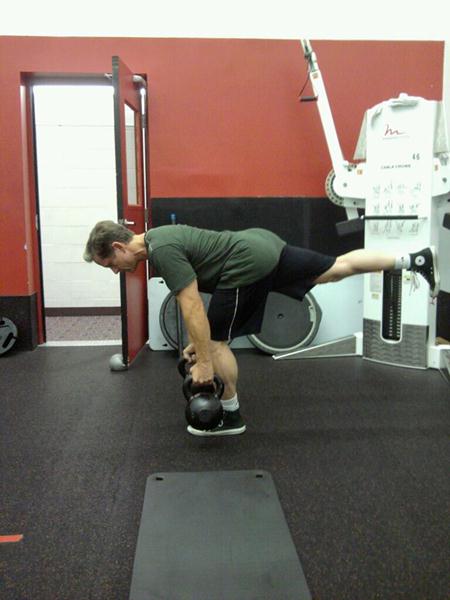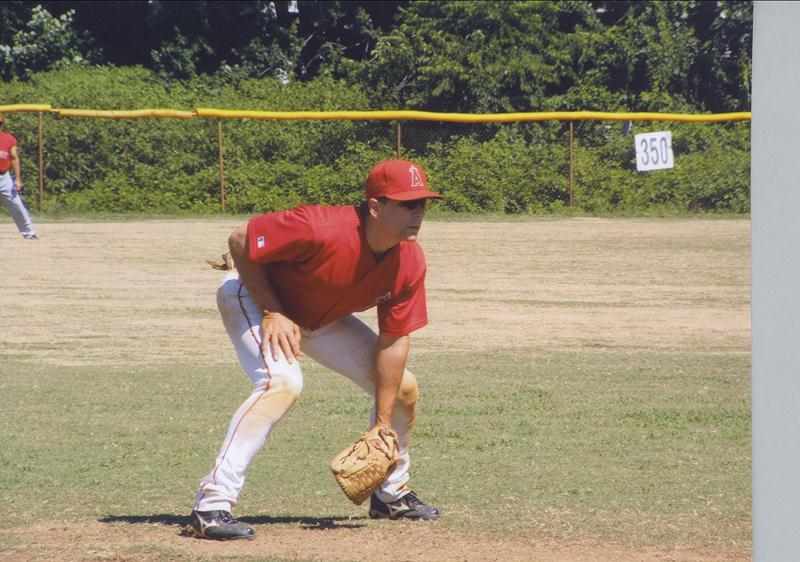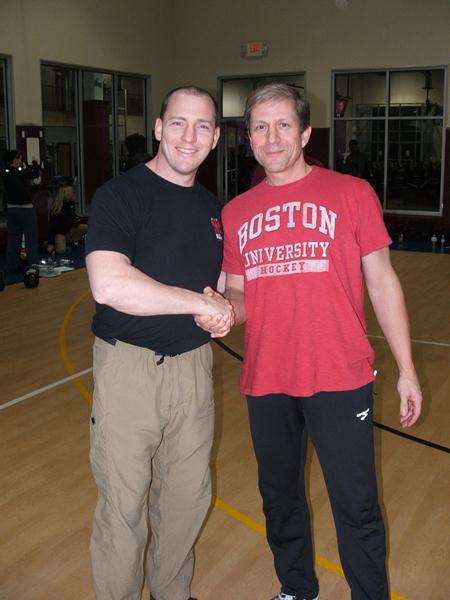
Dragon Door: How did you first find kettlebells?
Steven Head: I first saw kettlebells in a magazine and my knee-jerk response was, "Here's another gimmick." I didn't appreciate how the offset mass and momentum of the movements could change the dynamic of a dead weight. Since they kept popping up in print, I investigated and learned that kettlebells are very useful tools. At the time, I was the fitness director at a health club and organized a kettlebell workshop—this was about three or four years ago. One of the club members learned of my interest, and took me to my first kettlebell class at Underground Athlete here in Fairfax, Virginia.
Dragon Door: You've been in the fitness industry for 30 years, what inspired your choice?
Steven Head: I had an epiphany when I was 16 years old. I had been very active in sports since the age of seven, but at 16, I took my first backpacking trip on Mount Robertson. With about 35 pounds on my back, some friends and I planned to camp for a few days. But I was so out of shape that I couldn't enjoy it because I was struggling and suffering. I smoked cigarettes all through high school and wasn't running and conditioning. I was young, naïve, and thought the hike wouldn't be very difficult, so it was enlightening. If I had been in better shape, it would have been a great experience. Right then, I decided to get myself in shape so I could enjoy activities like backpacking.
In 1974, my neighbor introduced me to yoga. He recognized that I had begun lifting weights, and asked if I was flexible. He showed me a yoga shoulder stand into plow, but when I couldn't do it, I was blown away. I bought a yoga book by Rachel Carr which is still on my bookshelf. Next, I went into the service and began long distance running. I had incredible endurance, but I didn't like the way I looked, so I gave up running, and tried bodybuilding. While I was in the Air Force, I briefly competed.
In 1980, after the Air Force, my mother suggested that I become a physical therapist since I like exercise and helping people. But, after community college, with a 3.2 grade point average, I didn't think I would be able to make it into a competitive physical therapy school. Fortunately, I saw an advertisement for a new undergraduate program at Marymount College of Virginia in Physical Fitness Management, so I transferred and enrolled in the program. After I graduated, I thought there might be more money in financial services, and ended up training the CEO and CFO of the financial planning firm which hired me. I really enjoyed helping these guys stay in shape a lot more than actually working in finance. So, in 1987 I decided to become certified with the American College of Sports Medicine as a health and fitness instructor.

Dragon Door: Obviously, exercise and health have been very influential in your life—how has this focus helped you outside the gym?
Steven Head: I credit exercise with saving my life. Depression hit hard when the woman I'd hoped to marry was killed in 1992. I was in therapy for three months. People who don't understand depression have a hard time relating, but it can take people's lives. With the exception of three weeks after Shelly's death, I had not gone without regular exercise since I was 18 years old. My life and professional growth slowed to a crawl but I never gave up exercise—it was my lifeline. Exercise and my faith really helped me beat depression. I also felt like I had the gift of helping others with their fitness.
For many years, I just kept faithful to my commitment to exercise and "trusted life," believing I would survive, prevail, and maybe even triumph. I've lost a brother, a sister, two girlfriends, and three of the closest friends I've ever had—my depression is very real.
I was functionally depressed, getting through the days at about 30%. I got through my depression, but it held me back professionally. Now, I'm pretty happy where I am, and with what I've accomplished with my clients. I'm really proud of how many people I've helped with their chronic back pain, knee pain, shoulder pain, and even depression.
One of my clients had low back pain and was also being treated for depression. Not long after we started training and moving, he began to see some hope. After reducing his back pain, he also started to come out of his depression. Exercise and movement are powerful. Even when I was barely making the rent and going nowhere, I stayed in this profession because I believe in it. We are lazier, fatter, and more sedentary than ever before, so these days I am even more passionate and proud of my work.

Dragon Door: How have the skills you learned at the HKC helped you?
Steven Head: Playing baseball is my passion and the focus of my conditioning—almost everything in my own training is aimed at improving my conditioning for baseball. And, all of the HKC skills are essential for my strength, conditioning, and injury prevention. Even though I'm 55 years old and playing on a 25 and over team, I can keep up with my teammates and opponents. Many of them are half my age! I play second base, third base and shortstop.
I played baseball from age seven up through high school, but injured my shoulder and didn't play again until 1998 when a client mentioned a local men's league. He said it was organized, but a lot of fun without much pressure, and that I should try it. At the time, I hadn't played baseball in 23 years! I tried it, and after realizing my shoulder was fine, my love of baseball came back. I could still throw a baseball, and throw it quite well in fact.
At that point I decided to learn how to condition myself and improve my performance as a recreational baseball player. I started to research new ways of training, while leaving behind my old, antiquated approach to exercise. That's when I found out about the HKC. Rediscovering baseball was huge for me, and it lead me to discover new methods of training for baseball that were beyond what I had been doing for years.

Dragon Door: When did you get your HKC?
Steven Head: A little over a year ago. I had been researching training for sports and found Brett Jones on the internet. I also saw that kettlebells were becoming popular as a legitimate training tool, so I wanted to learn how to use them well. I realized there are specific nuances with kettlebell techniques, and that Dragon Door's RKC and HKC were the pinnacles for kettlebell training. I wanted to have a certification, and I wanted to learn how to do it right.
At first, when I found out that they were only going to teach me the get up, swing, and goblet squat at the HKC, I wondered if it would be enough. After the HKC workshop, I realized that any more would have been too much for one day. I gained an appreciation of how much work and practice is necessary to master these skills. I also have a much better appreciation of the conditioning possible with kettlebell swings.

Dragon Door: How has the information from the HKC helped your clients?
Steven Head: Being able to teach the swing and the get up to my clients safely and correctly has been tremendous—there are so many great benefits from each of those exercises. Once a client is comfortable with the swing, I encourage them to buy a kettlebell (or two) to have at home for a good workout if they can't get to the gym. Because the swing is patterned from the deadlift, clients who haven't learned the deadlift before have the added bonus of learning it too. My clients have developed tremendous confidence from the ability to move from the hips and lift heavier weights than they'd ever imagined they could.
For both my clients and myself, the swing is a great way to incorporate power without the risk—especially for the over 40, general population crowd. Plus, kettlebell swings don't have the lengthy learning curve associated with Olympic lifts. The get up is a fantastic tool for checking on and improving mobility, stability, and symmetry.
Dragon Door: Are you currently leading kettlebell classes?
Steven Head: For the first time this fall, I am planning a class centered on teaching the kettlebell swing. It has become a popular exercise, and many people are missing the essence and nuances which make it great. The swing, get up, and goblet squat are all powerful in their own right. The swing has great potential to impact body composition through metabolic conditioning. It also "lights up" the entire posterior chain, which I think has the greatest impact on long term low back health, strength, and injury prevention.
The people who I most want to help are average individuals who realize in their 40s or 50s who need to get in shape safely. I have a 74-year-old client who pushes a 250 pound sled down 90 foot hallways, and does real push-ups. He’s fitter than some people who are 30 years his junior, and it has been so gratifying to train people like him.
My philosophies about health and fitness are really extensions of my faith. I believe we were put together by an intelligence that we can't comprehend. We do our Creator a disservice by neglecting the health of our bodies. Physical activity shouldn't be over at age 40, and many people are now showing that they are still capable of being active through their 70s and beyond. Most people are falling apart, and I think it's a shame that while 80% of the US population believes in God, they don't seem to respect or appreciate the gift our bodies represent. Looking at the economic impact of neglecting our health, it's practically a civic duty to take care of ourselves. One of my favorite quotes is from Herbert Spencer who says, "Few seem conscious that there is such a thing as physical morality." I think taking care of ourselves is a duty, an obligation.
Dragon Door: Makes sense to me—thank you for talking to me today, Steven.
Steven Head: Thank you so much.
Steven Head began his career in the fitness industry in 1978. He is now an HKC instructor, Master Trainer at Sport and Health, Inc., a massage therapist, and has additional certifications from HFI, NASM-PES, CSCS, CPT, CES, FMS, IYCA. He is also a Yoga Alliance registered yoga teacher.